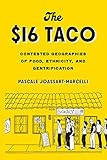The sixteen-dollar taco : contested geographies of food, ethnicity, and gentrification / Pascale Joassart-Marcelli.
Publisher: Seattle : University of Washington Press, 2021Description: xi, 276 pages : illustrations ; 24 cmContent type:- text
- unmediated
- volume
- 9780295749273
- 9780295749280
- USD16 dollar taco
| Item type | Current library | Home library | Collection | Call number | Materials specified | Copy number | Status | Date due | Barcode | |
|---|---|---|---|---|---|---|---|---|---|---|
| AM | PERPUSTAKAAN TUN SERI LANANG | PERPUSTAKAAN TUN SERI LANANG KOLEKSI AM-P. TUN SERI LANANG (ARAS 5) | - | GT2853.U5J633 (Browse shelf(Opens below)) | 1 | Available | 00002273125 |
Includes bibliographical references and index.
'White middle-class eaters are increasingly venturing into historically segregated urban neighborhoods in search of'authentic' eating in restaurants run by-and originally catering to-immigrants and people of color. What does a growing white interest in these foods mean for historically immigrant neighborhoods and communities of color? What role does foodie culture play in gentrification? In this study of how ethnicity, race, food, and place are co-produced, Pascale Joassart-Marcelli sheds light on food gentrification and the emotional, cultural, economic, and physical displacement it produces. She explores three neighborhoods of San Diego, California where'authentic' ethnic food attracts growing numbers of affluent white consumers, while the black and brown people who make this food continue to struggle with economic insecurity and food apartheid. Drawing on rich interviews with the locals who work, live, cook, and eat in these contested landscapes, Joassart-Marcelli maps the shift of foodscapes from serving the needs of long-time minoritized residents to pleasing the tastes of younger, wealthier, and whiter newcomers. She also shows how food becomes a powerful force behind gastrodevelopment, an urban development strategy built around food gentrification. Joassart-Marcelli highlights the ways in which immigrants and people of color are resisting gentrification and simultaneously fighting for food sovereignty. Ultimately, the work offers valuable lessons for cities all over the country where food projects are transforming neighborhoods at the expense of the communities they claim to uplift and celebrate. The book reveals the negative consequences of foodies' contemporary love affair with ethnic and presumably authentic food on the urban neighborhoods where such food has long been a source of livelihood, sustenance, resistance, and belonging. Doing so, it engages critically with the concept of cosmopolitanism and points out the limitations of consumer-centered food-based cross-cultural encounters that celebrate racial and ethnic difference without acknowledging the material consequences of historical and ongoing exclusion, dispossession, and displacement'-- Provided by publisher.
There are no comments on this title.

